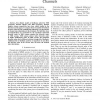Free Online Productivity Tools
i2Speak
i2Symbol
i2OCR
iTex2Img
iWeb2Print
iWeb2Shot
i2Type
iPdf2Split
iPdf2Merge
i2Bopomofo
i2Arabic
i2Style
i2Image
i2PDF
iLatex2Rtf
Sci2ools
106
Voted
CORR
2008
Springer
2008
Springer
Two Models for Noisy Feedback in MIMO Channels
Two distinct models of feedback, suited for FDD (Frequency Division Duplex) and TDD (Frequency Division Duplex) systems respectively, have been widely studied in the literature. In this paper, we compare these two models of feedback in terms of the diversity multiplexing tradeoff for varying amount of channel state information at the terminals. We find that, when all imperfections are accounted for, the maximum achievable diversity order in FDD systems matches the diversity order in TDD systems. TDD systems achieve better diversity order at higher multiplexing gains. In FDD systems, the maximum diversity order can be achieved with just a single bit of feedback. Additional bits of feedback (perfect or imperfect) do not affect the diversity order if the receiver does not know the channel state information.
Related Content
| Added | 10 Dec 2010 |
| Updated | 10 Dec 2010 |
| Type | Journal |
| Year | 2008 |
| Where | CORR |
| Authors | Vaneet Aggarwal, Gajanana Krishna, Srikrishna Bhashyam, Ashutosh Sabharwal |
Comments (0)

